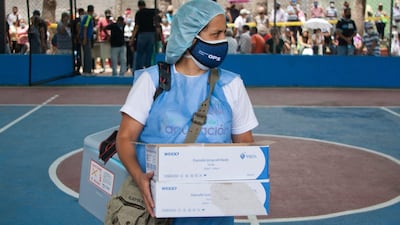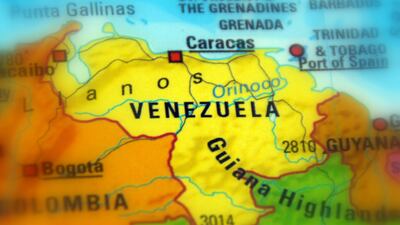Venezuela
Country
The exemptions allow for face masks, diagnostics and oxygen tanks, among others, to be shipped to Iran, Syria and Venezuela without specific permission.
Venezuela has accused the pharmaceutical industry of holding up medicines supplies and says it will acquire them instead through the Pan American Health Organization.
Vikas Bhadoria, director, McKinsey & Company, suggests that pharma should ride through turbulence in some of the "fundamentally strong" but currently challenging emerging markets, risk mitigation approaches in tow.
Turbulence in some emerging markets doesn't worry GlaxoSmithKline: its senior vice president and area head, emerging markets/Australasia, Rogerio Ribeiro is confident that the company's strategy is on point to sustain growth in these territories. Sales of Seretide/Advair saw double-digit declines in the US and Europe in 2015, but Ribeiro, who is responsible for GSK's business in over 100 countries, tells Scrip that there's "good growth" left for the product in emerging markets, with its flexible pricing approach. The strategy already appears to have paid off in India,where GSK's Seretide business has made strong gains alongside improving patient access. Last year, GSK slashed prices of its Seretide Accuhaler by around 46% in the country, creating a flutter in the Indian respiratory market long dominated by domestic firms like Cipla. In 2015, GSK reported global Seretide/Advair sales of £3.7bn, down about 30% from their peak in 2013. In an e-mail interview with Scrip, Ribeiro, who was at BioAsia 2016 in Hyderabad earlier this week, also touched upon how GSK is moving to modernise interactions with healthcare professionals in a digital world. GSK's Rogerio Ribeiro Scrip: Emerging markets (EMs) continue to be volatile – Venezuela, Russia in particular. Capacity constraints have also impacted a number of products across EMs for GSK. How do you see EMs shaping over the next 12-months? Rogerio Ribeiro: The varying social, political and environmental factors in emerging markets mean that economies move through cycles at different times so it is not unusual to have volatility in some markets and opportunity in others. However, the current general trend for emerging economies shows them continuing to grow at a faster rate than the developed world, presenting a significant opportunity for healthcare companies. We are confident that we have the right strategy for continued growth in emerging markets. We see India as a country with significant potential and are committed to further develop our business here. This is why we have made significant investments in manufacturing and by increasing our share in consumer healthcare and pharmaceuticals companies in India. Scrip: On capacity constraints for products like Augmentin, others… does GSK see this easing here on and would the new Indian sitehelp?RR: We are seeing significant improvements in our supply performance and expect to continue on this course. We are increasing our manufacturing capability in India, including working with our network of contract manufacturers to build the capacity we will require for the future. We are also investing in our existing facility at Nashik and building a new factory in Vemgal, Bangalore. We anticipate our new factory will begin commercial production in mid-2017. It will be the largest solid dose form site in the GSK network with a warehouse, site infrastructure and utilities to support the manufacturing and packing of up to 8 billion tablets and 1 billion capsules per annum, increasing our ability to bring more medicines of value to patients in India who need them. Scrip: GSK's emerging market respiratory sales declined 1%, with Seretide down 5% in 2015. But, for all the noise, generic players don't seem to have made a very big dent yet. Does GSK see a bottoming out of price pressures anytime soon and does its tiered pricing policy give the company flexibility to play prices in line in with conditions in markets like Russia, Brazil, Mexico and India?RR: In many ways to get the complete picture it is important to look at the growth dynamics of the overall portfolio including new products such as Relvar and Anoro. We believe there is good growth left for Seretide in emerging markets, particularly if we are flexible on pricing to be both competitive and to improve patient access. We have had notable successes in many countries with this strategy. India is a very good example where we reduced our Seretide price, thereby improving patient access and at the same time doubling our business. Scrip: At the end of 2013 GSK unveiled critical changes to the way it interacts with healthcare professionals; it expects to develop new digital, personal and real-time applications for better delivery of information. How is this playing out in emerging markets? Will it mean a big shift in GSK's marketing approach, including cutbacks in sales teams or building the medical teams? RR: The changes that GSK is making to improve and modernise our interactions with healthcare professionals are being implemented across the world, including emerging markets. Some markets are ahead of others, but we are making great strides and learning as we go. For example, India recently held digital meetings for 2,000 healthcare professionals for the critical care and thrombotic care portfolio and the results were very encouraging. We are currently investing in building the capabilities of all our employees across the sales, marketing and medical teams so that they operate effectively in a multichannel, digital environment and we are recruiting additional medical experts in some areas of the business. All of these teams play a critical role in providing healthcare experts and professionals with the information they need about our medicines, when and how they want it, in order to help them provide patients with better treatment. Scrip: We've seen some large multinationals divest or prune their long-listed, older portfolio/established brands in markets like India, Japan etc. to focus on newer products. Does GSK expect to consider such pruning in emerging markets? RR: Many of our mature medicines continue to grow year on year, particularly in emerging markets, and we continue to make adjustments to optimise our portfolio and improve profitability in some areas. Our established products portfolio is a significant contributor to our overall business performance and consistent with our goal of maximising shareholder value, we have no plan to divest these products.
Pfizer Inc.'s pending $160bn merger with Allergan PLC may be its best shot at significant revenue growth this year, since the company's 2015 revenue and earnings fell below 2014 totals due to foreign currency impacts and the loss of patent exclusivity for multiple products – factors that again could lead to flat growth during the current year, despite meaningful sales gains for certain products.
Glenmark Pharmaceuticals Limited has reported strong growth in the third quarter ended December 2015, despite the challenges in certain emerging markets, from where it sees "diminishing" contribution to revenues here on.
GlaxoSmithKline plc is one of the first major pharma companies to announce plans to assess its current vaccine development platform in hope of starting research on a vaccine for Zika virus (ZIKV), following an outbreak of the disease in a number of countries.
The pharma industry's (and the media's) interest in Ebola has begun to wane as more affected African countries secure disease-free status from the World Health Organization, but another tropical condition has started to capture headlines – Zika virus (ZIKV), a mosquito transferred disease reportedly responsible for approximately 4,000 child birth defects since Oct. 2015.
Pharmaceutical companies wanting to sell high-cost drugs in Latin America may find themselves talking with multiple countries at once to find a single acceptable price. Mercosur member and associate countries are wielding their collective might to secure lower prices through a new negotiation mechanism supported by the Pan American Health Organization / World Health Organization. Mercosur health ministers have already announced an offer from Gilead to supply its hepatitis C drug Sovaldi (sofosbuvir) and next up for discussion are likely to be costly cancer medicines.
Caution and calibrated supplies appear to be the approach that the pharmaceutical industry is adopting in Venezuela as the South American nation grapples with one of its worst economic crises, with a plunging currency and shortages of food and medicines.
Dr Reddy's Laboratories Ltd reported robust growth for the second quarter ended September, but plant-related concerns appear to weigh on the firm's near-term prospects.
Dr Reddy's Laboratories will take to market Australian firm Hatchtech Pty Ltd's late-stage, next-generation head lice product in a deal potentially worth up to $200m.


